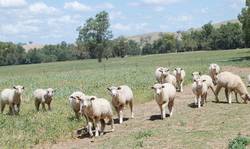Queensland Country Life | 4 January 2021
by Andrew Marshall
Farmland investing pays solid 12pc return, but China tensions niggle
by Andrew Marshall
Bullish returns from farmland investments are likely to falter in 2021 because of Australia's increasingly prickly trade relationship with our huge agricultural export customer, China.
However, the tensions are not expected to have long term impacts or undermine the strong sentiment towards investing in rural property, says corporate scale farm manager Argyle Capital Partners.
Argyle, which manages about $800 million in rural water and farming assets, is one of the investment groups whose property portfolio is monitored as part of the Australian Farmland Index.
The index of managed farmland investments worth about $1.2b, posted strong annualised returns of 12.3 per cent in the third quarter of last year, although the results were down from almost 14.4pc a year earlier.
While annualised income was up more than one percentage point to 7.07pc for the year, capital growth dropped from 8pc in September 2019 to about 5pc in 2020.
For the past five years annualised returns have averaged 13.7pc - down slightly on a year ago.
However, volatility in the agricultural index over the period was just 6.3pc.
"The risk return profile reflected in the farmland index compares very favourably to Australian equity market investments," noted Argyle Capital Partners in commentary accompanying the latest index results.
"The index suggests patient investors are well compensated for the relative illiquidity of farmland investments."
China syndrome
However, the fund management group said the farm sector had been impacted by "arbitrary, punitive tariffs and other trade bans imposed by China on Australian exports, despite a bilateral free trade agreement in place since 2015".
To varying degrees barley, wine, beef, lamb, cotton, fresh seafood and fresh produce exports had all been affected.
"In the short term we anticipate the China trade imbroglio will impact farmgate commodity prices in some sectors, and may marginally dampen farmland revenues in the year ahead," Argyle's commentators noted.
"However, we do not expect any long term impacts or negative sentiment towards Australian farmland investments."
Argyle's researchers noted Australian farm sector exporters had proven resilient and ingenious in dealing with market shifts in past decades and were now expected to increasingly focus on other export opportunities in Asia and the Middle East.
Robust appetite for ag
Director of research at the Asian Association for Investors in Non-Listed Real Estate Vehicles (ANREV) Amelie Delaunay said Australian farmland investments reflected robust investment appetite in the asset class.
Farmland investing had a low correlation with traditional investment markets and was being supported by current low interest rates.
ANREV, based in Hong Kong, has just taken over calculating the farmland index after it was established under the auspices of a similar US-based not-for-profit body NCRIEF.
"The index raises the importance of agriculture as an investable asset class and delivers essential transparency to institutional investors," Ms Delaunay said.
"It provides quality information to professional investors on institutional grade agriculture assets, allowing them to fully assess the sector from an income and capital return basis compared with other investment classes."
According to the latest index reading, growth in asset valuations for the September quarter saw a rise in quarterly capital growth to 1.56pc for the three months, compared with 1.32pc in June and just 0.37pc a year earlier.
However, despite much improved seasonal conditions and surging livestock values in 2020, latest quarterly income returns from agricultural assets slipped to less than 0.5pc from about 1.5pc in June and 2.1pc a year ago.
Export commodity prices could continue to reflect trade disruption pressures this year, but Argyle noted how rainfall had revived south eastern Australia's production capacity, also bringing irrigation water costs down to long term average values.
The ANREV farmland index tracks the income and capital appreciation performance of 42 different properties managed by some of Australia's major agricultural asset managers, of which 72pc by value were permanent horticultural crops and 28pc were annual farmland assets.













